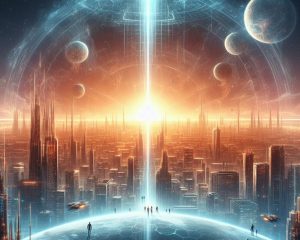There are no aliens in our universe? The Transcension might be to blame

 The transcension hypothesis is one of the possible solutions to the Fermi paradox, which asks why we haven’t detected any signs of extraterrestrial intelligence (ETI) in the vastness of the universe.
The transcension hypothesis is one of the possible solutions to the Fermi paradox, which asks why we haven’t detected any signs of extraterrestrial intelligence (ETI) in the vastness of the universe.
The Fermi paradox assumes that some fraction of advanced civilizations would become spacefaring and colonize the galaxy, or at least send out signals that we could detect with our current technology.
However, so far, we have found no evidence of such activity, despite the high probability of life emerging on other planets.
The transcension hypothesis proposes that instead of expanding outward, sufficiently advanced civilizations may invariably leave our universe and enter into “inner space”, a domain of higher dimensionality, density, diversity, and complexity.
This process may be driven by the accelerating development of technology, which leads to a singularity event where the civilization undergoes a fundamental transformation that makes it incomprehensible and inaccessible to us.
Futurist John M. Smart proposed something called the transcension hypothesis.
“The transcension hypothesis proposes that a universal process of evolutionary development guides all sufficiently advanced civilizations into what may be called ‘inner space,’ a computationally optimal domain of increasingly dense, productive, miniaturized, and efficient scales of space, time, energy, and matter, and eventually, to a black-hole-like destination,” Smart explained in a 2012 paper.
According to this hypothesis, transcension is a universal process of evolutionary development that guides all civilizations towards greater levels of intelligence, information processing, and complexity.
Transcension may involve the creation of black hole-like structures, quantum computers, simulated realities, or other technologies that allow the civilization to explore the ultimate limits of physics and computation.
Transcension may also involve the emergence of post-biological life forms, such as digital minds or collective consciousnesses, that transcend the physical constraints of matter and energy.
This may seem like pure hogwash, but the science behind it is not stupid. If, through our technological advancements, we are able to continue on this exponential growth scale where the lines between AI, machines in general, and humans get blurred and jumbled together, who is to say how we will seem as a species in thirty years when compared to present-day humans?
In science fiction, advanced alien civilizations are portrayed as intergalactic species that go around harvesting resources from uninhabited worlds or conquering star systems.
Transcension hypothesis takes us a little further in time. It says that sufficiently advanced civilizations use STEM compression to create black hole-like conditions. They become so small that they transcend the limitations of the visible universe and wander around in a different space-time reality to probably interact with other transcended civilizations.
This hypothesis has several implications for the search for extraterrestrial intelligence (SETI) and the messaging to extraterrestrial intelligence (METI).
First, it suggests that we may not be able to detect any signals from advanced civilizations because they have already transcended our observable universe and are communicating in ways that we cannot intercept or decode.
Second, it suggests that we may not be able to contact any advanced civilizations because they have no interest or need to interact with us or any other lower-level entities.
Third, it suggests that we may not be able to understand any advanced civilizations because they have evolved beyond our comprehension and operate on principles that are beyond our logic and intuition.
The transcension hypothesis is based on several assumptions and speculations about the nature of universal evolution and development, which may not be valid or testable. It also faces several challenges and criticisms from alternative perspectives and scenarios.
For example, some argue that transcension is not inevitable or desirable for all civilizations, and that some may choose to remain in our universe or even reverse their development.
Others argue that transcension is not possible or feasible for any civilization, and that there are physical or computational limits that prevent it or that transcension is not relevant or meaningful for any civilization, and that there are ethical or existential reasons to avoid it.
The transcension hypothesis is an interesting answer to the Fermi paradox, but it is not a definitive or conclusive one. It is one of many possible hypotheses that attempt to explain the apparent absence of ETI in our universe.




